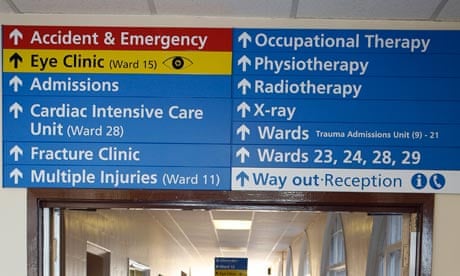Few children admitted to hospital with serious health problems in the evening or at weekends will see a senior paediatrician as soon as they should, according to the royal college that represents specialists in children's medicine.
The Royal College of Paediatrics and Child Health said services needed to be concentrated in fewer hospitals and more children treated in the community – which would mean some closures.
The college said it was encouraging to find in an audit that many units were meeting its standards, but some were not. Overall, nearly 23% of children admitted did not see a senior paediatrician within four hours, it said, and 12% did not see a consultant paediatrician within the first 24 hours.
The situation is much worse in the evenings and at weekends. The proportion of children's hospital units with a consultant present for the whole of what the college considered the peak-time period, between 5pm and 10pm, was 11% on weekdays and 6% at weekends. The figures were higher for units' self-identified peak hours, at 26% on weekdays and 20% at weekends.
If a paediatrician was not available in the hospital there should be somebody at the end of a phone so that juniors could get immediate advice, the college said. However, it said, "immediate telephone advice is not always available across some specialities – and arrangements are often informal".
The audit carried out by the college used 10 standards set by its Facing the Future report as a basis for assessing how many senior staff were needed for children to be safe and well cared for. The college found that numbers of staff were short of the optimum across the board.
"There are countless examples of paediatricians going beyond the call of duty to deliver out-of-hours care – and it is thanks to the diligence and dedication of these doctors that most of the standards are being met and the level of healthcare delivered to children remains high," said Dr Hilary Cass, president of the college.
"But perhaps the most concerning area is the consultant presence at times of peak activity. When units are at their busiest, it's crucial that the most experienced and skilled members of the team are present – and currently this isn't happening in too many services.
"Acute paediatricians are under significant pressure within the current structures and we have to be prepared to re-examine the way in which we deliver care, because this way of working is not sustainable."
The audit found that some units treated the standards as the bare minimum for service provision while others picked standards that they felt were more applicable to their unit than others rather than attempting to meet all 10. Often this was due to resources being spread too thinly.
"There are too many units in the UK to provide a safe and sustainable service; health services can't continue in their current form," Cass said. "Reconfiguration needs to happen to deliver the best possible care to children and young people. We also need to look at more innovative models of service provision, providing more care in the community. But it's going to take bold and brave leadership to make it happen."

Comments (…)
Sign in or create your Guardian account to join the discussion